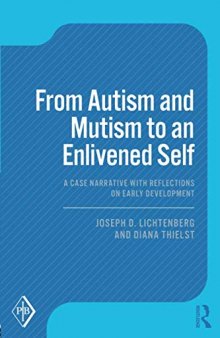 جزییات کتاب
جزییات کتاب
From Autism and Mutism to an Enlivened Self explores the importance of intimacy, interaction with the environment and the mind-body connection in early childhood development, with specific reference to autism. Built around a detailed case study of a severely autistic child, the book offers an illuminating account of the development and successful treatment of autism both from the perspective of the clinician and from the family. In Part I, Diana Thielst (writing under a pseudonym) gives a description of her experience with her daughter who was autistic at birth, minimally verbal at age five, and did not respond to her name. She details the severe family stress and her ineffectual attempts to get professional help. Finally, she hears of consultants who may be able to help in St. Petersburg, Russia. Guided by the consultants, Thielst and her daughter then embark on a uniquely innovative method for Anna to both build a vocabulary and for the first time learn the value of coordinated and cooperative effort. Armed with a vocabulary and a long history of solo pursuits of organizing inanimate objects, Anna suddenly begins to explore "human" interaction as revealed in comics– a turning on to an emotional life of relatedness and intimacy.In Part II, Joseph D. Lichtenberg uses his knowledge of neonate and early infancy to offer the reader an understanding of autism – its history – and a unique comparison of the normal well adapted neonate and infant at one year with the disrupted development of the child with autism. Lichtenberg’s theoretical construct of three major pathways to a healthy adapted development breaks new theoretical ground and gives enrichment to a contemporary portrayal of the autistic experience.With unusually rich clinical material grounded in accessible theory, the authors jointly offer a new perspective on understanding, treating and living with autism. From Autism and Mutism to an Enlivened Self will appeal to psychoanalysts, psychoanalytic psychotherapists and clinicians working with autistic children.



 دانلود کتاب
دانلود کتاب

 جزییات کتاب
جزییات کتاب





 این کتاب رو مطالعه کردید؟ نظر شما چیست؟
این کتاب رو مطالعه کردید؟ نظر شما چیست؟
